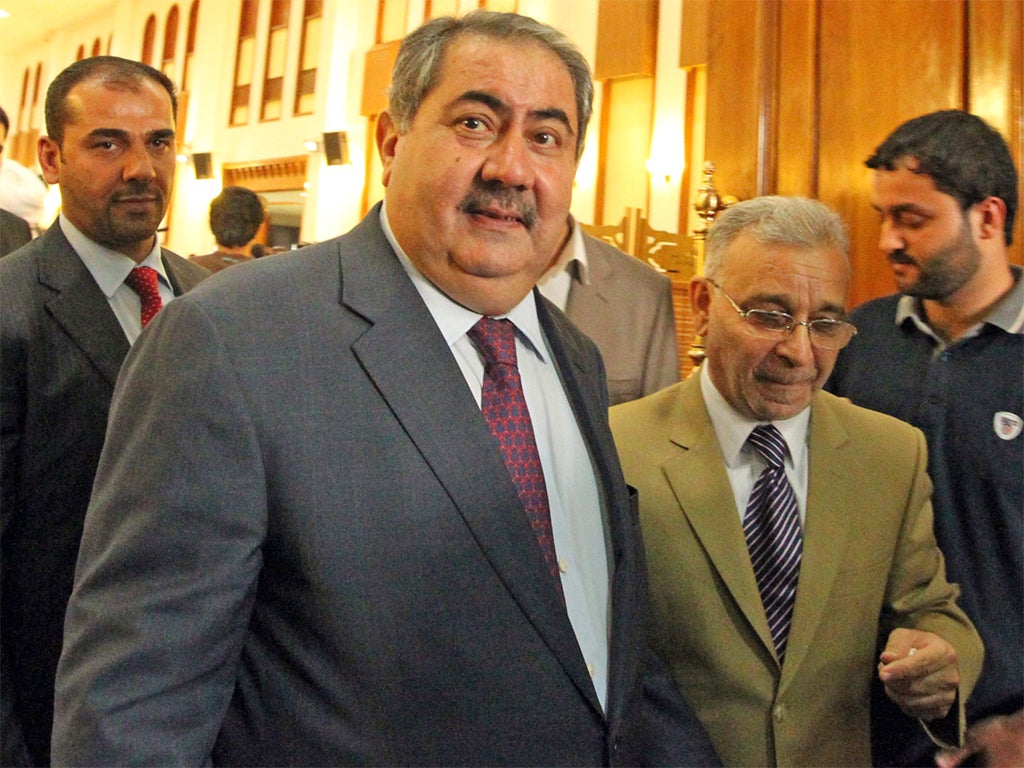Syria crisis: Only full-scale war can unseat Assad, says Iraqi minister
Hoshyar Zebari tells Patrick Cockburn that Syria’s President will ‘survive’ rebel uprising

Syrian President Bashar al-Assad is not going to lose power unless there is foreign intervention amounting to a full-scale war, according to a leading Middle-East politician.
Iraqi Foreign Minister, Hoshyar Zebari, said with a united army in control of Damascus and the major Syrian cities, Assad “will survive for the foreseeable future”. Mr Zebari, pictured below, is one of the few leaders to be in touch with all parties in the Syrian civil war, including the government and various factions of the opposition, along with their foreign backers.
In an interview with The Independent he expressed pessimism about peace negotiations in Geneva proposed by the US and Russia, but said he believes that the best way forward may be a ceasefire policed by the UN prior to any agreement on a transitional government. He said: “I think it would be possible to do that with strong engagement by the UN to follow through and maybe some international peacekeepers.”
He was scornful of recent speculation about the possibility of a military coup in Damascus displacing Assad. He said “the idea of the army moving is a recent invention”, adding that it reminded him of abortive attempts by the CIA to organise the overthrow of Saddam Hussein in the 1990s, but that “this kind of regime is coup-proof”. Prime Minister David Cameron gave the impression in a recent speech that he thought that the Syrian army and security apparatus might be encouraged to move against the regime.
Mr Zebari said he believes that the stalemate on the ground would not be broken even if the government or the rebels captured a few towns. “I saw lots of people but it is very depressing,” he said of recent meetings in the Middle East and Europe with all those involved in Syria, adding: “Nobody has any idea how to help.”
The Gulf monarchies are supplying advanced weapons to the rebels and the US and the Europeans “are conducting some covert operations in Syria and helping the Syrian opposition”. But he is convinced this will not really change the balance of forces on the ground which would only happen in the event of full-scale foreign intervention amounting to all-out war against the regime. He is equally convinced that there is no political will to do this and Mr Assad, Iran and Russia are fully aware of this.
Mr Zebari points out that when the US and Russia agreed to try to bring the Syrian government and opposition together at Geneva, the US effectively accepted that Mr Assad would be there: “When [Russian Foreign Minister Sergei] Lavrov and [US Secretary of State John] Kerry agreed on Geneva II it meant that Assad would stay in power until 2014 or until he finishes his term.” Syrian ministers visiting Baghdad made it clear that removing Mr Assad as head of state or army commander-in-chief was a red line for Syria.
The Russians have pressed for Iran to attend a Geneva meeting but the US and the Gulf states are opposed. “The Iranians are desperate to attend,” said Mr Zebari after meetings in Tehran. “I said to them that unless you behave yourself from now until then your prospects for attending are very slim.”
Iran is a crucial ally for the Syrian government, but the US and its allies do not want to give Iran a place at the negotiating table. Iraq believes Iran should be there because of its influence on Syria and because Iran sees the assault on the regime in Damascus as a threat to itself.
Mr Zebari believes it unlikely that the oft-postponed Geneva II conference will take place at all and says that a conference on the sidelines of a UN meeting would not be taken seriously. The opposition still hopes that if it hangs on long enough there will be international intervention to overthrow Mr Assad along the lines of Nato military intervention in Libya in 2011. Mr Zebari said he has always told opposition leaders this is a pipedream.
He said that there is such a strong appetite internationally to do something to de-escalate the conflict that a renewed ceasefire arrangement might work. “They [foreign players] will go for anything to calm the situation.” But Mr Zebari said that such a ceasefire would require heavy involvement by the UN and international peacekeepers.
Subscribe to Independent Premium to bookmark this article
Want to bookmark your favourite articles and stories to read or reference later? Start your Independent Premium subscription today.

Join our commenting forum
Join thought-provoking conversations, follow other Independent readers and see their replies